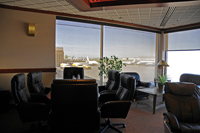
Features
Operations
heading in the right direction
The success or failure of FBOs is undeniably linked to the fortunes or losses of corporate flight departments.
July 14, 2010 By Rob Seaman
The success or failure of FBOs is undeniably linked to the fortunes or losses of corporate flight departments. Using that as a starting point, generally, the North American market for aircraft was deplorable last year and, to no one’s surprise, travel was greatly reduced. So too went the fortunes of most FBOs.
 |
|
| International travel, coupled with some special events, has without question fuelled activity for FBOs domestically. PHOTO: SUNWEST AVIATION
|
One of the few saving graces for aircraft sales last year came from growth overseas. Many FBOs were blessed with continued out-of-country traffic as a result – a welcome bright spot in their business. Looking at this year so far, there has been more balance as North American firms get back into the game. Charter activity has been steady again and international travel, coupled with some special events, has without question fuelled activity for FBOs domestically.
Recently, things have shifted a bit according to industry analyst Brian Foley. He feels that we have entered another stagnant period for general aviation (GA). “I see no cause for panic or even pessimism – certainly not at this point,” says Foley. “Most recoveries aren’t linear and the occasional pullback can be expected. A year ago we postulated this recovery might have a W-shape, and that appears to be what’s happening. The industry takes one step back before taking two more forward.” Foley suggests that European troubles may explain the current situation. “Europe is the world’s second largest business-aviation market. Financially, it’s been in disarray. Worldwide stock markets have responded with double-digit percentage drops. So how can any industry go unaffected, at least temporarily? Yet I don’t believe the long-term outlook really suffers. Europe and the markets will adjust themselves (they always do), at which point the recovery can resume in sync.”
What other issues are on the FBO horizon? The first is security. There is no question that what we all consider the status quo today is going to change. Right or wrong, FBOs are perceived by both media and some members of government as a weak link. According to comments made by the Hon. John Baird (Minister of Transport, Infrastructure and Communities) in the House of Commons on March 18, a new director general for Aviation Security has been appointed and the new director “is working hard with our team in every part of the country.” We have yet to hear something definitive from this office but, in the opinion of many, it is simply a matter of time before attention is turned to GA, and FBOs in particular.
 |
|
| Innotech’s new pilot lounge at the Montreal FBO. PHOTO: iNNOTECH AVIATION SERVICES
|
Another area of interest will be environmental issues. FBOs have numerous conservation and environmental responsibilities. For example, when tank farm stations come to maturity or the expiration in their life limit, replacement involves new and extraneous measures. At larger airports, there is a swing to central fuel depots from which all FBOs will draw their resale product. This should help mitigate fuel management issues going forward but the cost and effort to close and clean up a tank farm today is expensive and very involved. Increased pressure from communities adjacent to airports, environmentalists and liable-minded airport authorities also signals a further possible tightening of existing regulations with perhaps the introduction of new ones. What was at one time considered a small spill of almost anything aviation-related, now has new consequences and required procedures. More than one FBO has been caught in the midst of renovations having to correct product mismanagement or containment from years gone by. Basically, control and accountability of products – into and out of the aircraft – and management of them that includes removal and disposal are becoming bigger issues. FBOs are easy targets for the media and the misinformed public, so they must be seen as active and responsible and in many ways as partners for good environmental management.
Looking coast to coast to see where things are in the grand scheme, FBOs have varied reports. A major driver for the Vancouver market this year was the Winter Olympics and Winter Paralympics. A requirement for new and sophisticated security and passenger handling came with the potential increase in business. Farah Faruqi, sales and marketing at Avitat Vancouver/Interdel Aviation Services, feels that “the Vancouver 2010 Winter Olympics was a success. We were left with wonderful memories and an unforgettable experience. It truly has been a pleasure hosting the world and handling 350 plus corporate business jets from every corner of the globe.”
This event took years of detailed planning by all the FBOs, the airport authority, government officials and the CBAA. According to Faruqi, the plans paid off as operations proceeded flawlessly. All the FBOs were required to create special space for passenger screening – while still maintaining FBO standards of service and convenience. At Avitat YVR, a hangar was converted into a VIP executive passenger screening lounge that was fully staffed and operational 24 hours a day. The FBO also worked with all the governing authorities from Slot Reservation Office, Transport Canada, Integrated Security Unit, RCMP, CATSA, and Canada Customs to ensure all safety and security standards were met. “Our liaison allowed us to keep flight departments and customers informed of any updates and changes and ensure their arrival and departures were smooth,” says Faruqi.
Moving eastward, Skyservice Business Aviation’s FBOs in Calgary, Toronto and Montreal collectively report they see an optimistic trend. “You can see a rebound in the industry for sure – a sign that we are heading in the right direction,” says Alain Champonnois, vice-president of FBO and maintenance. He reports definitively that the numbers are up from last year and is hopeful this will translate to a trend for the rest of the year. “I believe in the industry in general. We have not yet matched pre-recession numbers although we are getting closer. People need to get on with business sooner than later.” As part of Skyservice’s effort to maintain high-end facilities and continually invest in its business, it is undertaking lounge renovations in Toronto as part of its rotating facility upgrades. The size of the space will remain the same but it will have a fresh look.
Air Creebec provides fuel and ramp services as the Imperial Oil agent at the Timmins and Moosonee Airports for scheduled and itinerant aircraft. Anne-Marie Farrington, marketing and operational support manager, reports that the company is taking voluntary action on the environmental challenge and have implemented an Energy Savings Plan in 2010 that involves every aspect of the company. From savings on heat to reducing paper usage, Farrington says it is already proving to be very successful. In terms of security concerns or the potential for new such initiatives, she echoes the feeling of most FBOs by saying that they are committed to ensuring adherence to security measures where applicable and are open to contemplating measures that might improve safety and security over time.
Innotech Aviation Services (Shell FBO) operates in Montreal, Halifax, Ottawa and Wabush, N.L. Joël Bédard, vice-president and general manager of Innotech-Execaire/Shell Aerocentre-Division of IMP Group Limited, comments, “Our overall business in the last three years has steadily increased beyond our expectations. Although the recession normally affects the airline and FBO business, we were successful in maintaining what we had and also grew the business.” How, you might ask, did this company manage to grow during a recession? According to Bédard, it started by reviewing all operating costs and negotiating better rates with service providers. “We did not lay off any employees; quite the opposite. Our business grew steadily and created a few more jobs. Reducing your costs does not mean doing more with less all the time. Sometimes just changing a process in your operation can make the whole difference.”
Bédard reports positive environmental responsibility. “Environment is extremely important to all of our employees. This is a collective effort and we always recycle everything we can. Waste fuel products, paper, batteries, light bulbs and more are picked up by an environmental company to deliver to recycling companies.” As for security, he advises that each of the company’s facilities is already fully compliant with all Transport Canada Regulations in this area. “We do see a need to always improve the security around the FBOs and this is a good thing for all our customers. Security is absolutely a must and we must never let our guards down. The most important piece of security is the employees, as they are the first barrier to ensuring that only authorized people gain access to the airport side and customer property.”
One thing you can always find in the Canadian FBO world is optimism. The industry-wide feeling seems to be that the worst is over, and that we are moving forward and seeing better days. That said, there are still some unknowns to face from government and overseers of the industry, but with all such things, we will adapt and forge ahead.